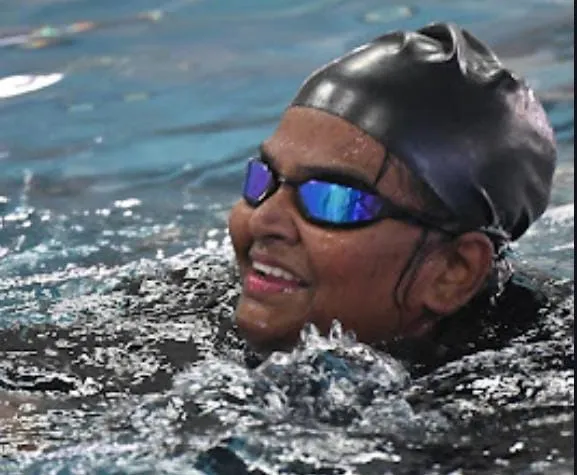Winning with disability: How this Chennai woman with polio became a swimming champion
Geetha Kannan had a long and arduous journey after her polio diagnosis. However, the para swimmer chose water and the swimming pool to find her freedom and reclaim control over her body.
Geetha Kannan has grown up with polio and an intense fear of water. As a child who couldn’t move her body from the neck below, the land was frightening enough for her. And water, she says, was a cause of dread, due to its association with drowning. “I was afraid to even be in the shower, where I felt I could be trapped, and water would enter my lungs,” says Kannan.
Nonetheless, her relationship with water evolved along with her healing journey, as she befriended the element to reclaim control over her body and its movement.
Today, at the age of 43, Chennai-based Kannan is a Paralympic swimming champion and won gold at the Tamil Nadu state-level Paralympic swimming championship held in March this year.
It turned out, water was the only surface I could move on from one end to another on my own. It gave me a sense of freedom I had not experienced ever in my life,” Kannan tells HerStory.
There was no looking back once she had the taste of freedom; she mastered the freestyle and front and backstroke techniques. Now, Kannan’s days are planned, where she clocks in 14 active hours of work and swimming practice every day.
Befriending water
By the age of two, Kannan was diagnosed with a type of polio that left her almost immobile and in need of support from her family for basic tasks.
Kannan's family lived in different cities across India as his father was in the Indian Armed Forces, and her mother sought treatment for Kannan everywhere they went. Through the course of these interventions, she could move every part of her body except her legs, which left her wheelchair-bound.
While every student in her school looked forward to the physical training (PT) period, Kannan admits that she dreaded it the most. “I always felt left out… so I put all my energy into studies and aced school during my public exams,” she adds.
Polio left Kannan’s left leg shorter by a few millimetres than her right leg, and she walked with the help of callipers on both legs all her adult life. Moreover, she also developed scoliosis—a medical condition where her spine developed an abnormal curve.
One would wish that would have been the end of her misfortunes, but in 2016, Kannan was involved in a car accident that left a tear in her left rotator—a group of four muscles and tendons that stabilise the shoulder joint allowing one to lift and rotate their arms.
With her left arm non-functional, Kannan overexerted her right arm, leading to degeneration in her bones. She was bedridden and in extreme pain for a whole year (2016-2017) and did not consent to surgery. At the time, her friend, Satish Kumar—who has cerebral palsy—introduced her to the team at Vidya Sagar, a 39-year-old institution working with people with disabilities in Chennai.
Here, Kannan met para swimmer Madhavi Latha Prathigudupu, who encouraged her to try hydrotherapy, which changed the course of her life. “With practice, I could move and manoeuvre in ways I had never done on land. And the pain that I had lived with for four years started wearing away in just 15 days,” she recalls.
After many decades, she experienced the spirit of play through swimming for the first time in her life. “I spent my childhood years wondering what it was like to jump, run, and play. Years later, this yearning also strengthened my bond with water. I was reliving lost childhood moments,” Kannan adds.
Soon after, she met her swimming coach, D Purushothaman. “After many failed and frightening attempts at floating previously, coach Purushothaman suggested I start with freestyle swimming. I was able to cross 25 metres in two months,” she says.

Kannan swims 100 metres a day ahead of every tournament.
Watching her progress, other swimmers at the Sports Development Authority of Tamil Nadu (SDAT) pool at Chennai’s Nehru Stadium urged her to swim competitively.
Today, Kannan swims 100 metres a day ahead of every tournament.
Kannan’s day starts at 6.30 am when she works as a teacher of accounting for students living abroad until 12.30 pm. Then, she prepares and eats her lunch and leaves for her swimming practice by 2.30 pm and is at the pool till late evening. By 9.30 pm, she is back at home, finishes her dinner, and sits down to work again.
An appeal for inclusion
Kannan, a mother of two boys, travels 34 kms every day from her home in Tambaram, a south Chennai suburb, to Periyamedu in the north, which has the only pool with a ramp and chair lift.
The chair lift helps Kannan get into the water and outside—a game changer, Kannan believes, for many para swimmers and aspirants.
“There is talent and grit among many young disabled people to join sports, particularly swimming,” she says, adding, “My husband drives me around, but many others don’t have a car as I do, and travel can be draining, tedious, and expensive for them."
“I wish more sports and swimming clubs around the city would bridge this gap for persons with disabilities with the understanding that sports often hold the key to not just freedom but a secure future for them,” Kannan says.
(The story was updated to correct typos.)
Edited by Suman Singh







